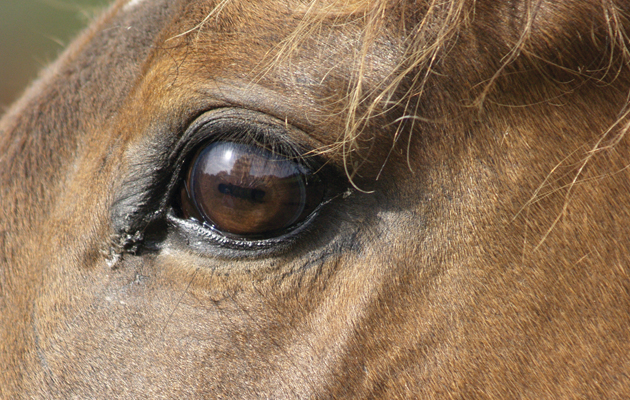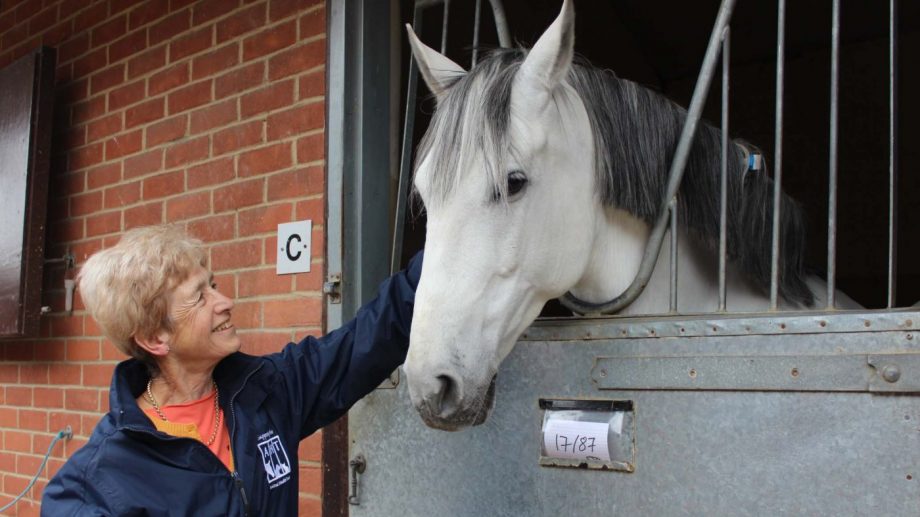The Royal College of Veterinary Surgeons disciplinary committee has announced its findings on charges against Sue Dyson. H&H finds out more
DR SUE DYSON said she has no recollection of writing a letter that led to her being struck off the veterinary register, stating she would never knowingly behave dishonestly.
The Royal College of Veterinary Surgeons (RCVS) disciplinary committee found that Dr Dyson was guilty of disgraceful conduct in a professional respect, after a hearing on 9 July.
The former head of clinical orthopaedics at the Animal Health Trust (AHT) was charged in relation to correspondence about a study she led into the effects of excess rider weight on horses.
{"content":"PHA+VGhlIGNvbW1pdHRlZSBoZWFyZCB0aGUgc3R1ZHkgcGFwZXIgd2FzIHNlbnQgdG8gYSBqb3VybmFsIGZvciBwdWJsaWNhdGlvbi4gRWRpdG9yIEthcmVuIE92ZXJhbGwgc2VudCBpdCB0byBiZSBwZWVyLXJldmlld2VkIGJ5IE1hdHRoZXcgUGFya2VyLCB3aG8gcmV0dXJuZWQgaXQgdG8gdGhlIGF1dGhvcnMgZm9yIHJldmlzaW9uIGFzIGhlIHdhcyBjb25jZXJuZWQgYnkgdGhlIGxhY2sgb2YgYSBIb21lIE9mZmljZSBsaWNlbmNlLjwvcD4KPHA+U29tZSByZXNlYXJjaCBpbnZvbHZpbmcgYW5pbWFscyBtdXN0IGhhdmUgc3VjaCBsaWNlbmNlcywgdG8gcHJvdGVjdCBhbmltYWxzLCBidXQgdGhlIEFIVOKAmXMgY2xpbmljYWwgcmVzZWFyY2ggZXRoaWNzIGNvbW1pdHRlZSBoYWQgbm90IHNlZW4gdGhpcyBwcm9qZWN0IGFzIG9mIGV4cGVyaW1lbnRhbCBuYXR1cmUsIHNvIGhhZCBub3QgYWR2aXNlZCB0aGF0IGl0IHNob3VsZCBiZSByZWZlcnJlZCB0byBhIEhvbWUgT2ZmaWNlIGluc3BlY3Rvci48L3A+CjxwPjxkaXYgY2xhc3M9ImFkLWNvbnRhaW5lciBhZC1jb250YWluZXItLW1vYmlsZSI+PGRpdiBpZD0icG9zdC1pbmxpbmUtMiIgY2xhc3M9ImlwYy1hZHZlcnQiPjwvZGl2PjwvZGl2PjxzZWN0aW9uIGlkPSJlbWJlZF9jb2RlLTMxIiBjbGFzcz0iaGlkZGVuLW1kIGhpZGRlbi1sZyBzLWNvbnRhaW5lciBzdGlja3ktYW5jaG9yIGhpZGUtd2lkZ2V0LXRpdGxlIHdpZGdldF9lbWJlZF9jb2RlIHByZW1pdW1faW5saW5lXzIiPjxzZWN0aW9uIGNsYXNzPSJzLWNvbnRhaW5lciBsaXN0aW5nLS1zaW5nbGUgbGlzdGluZy0tc2luZ2xlLXNoYXJldGhyb3VnaCBpbWFnZS1hc3BlY3QtbGFuZHNjYXBlIGRlZmF1bHQgc2hhcmV0aHJvdWdoLWFkIHNoYXJldGhyb3VnaC1hZC1oaWRkZW4iPg0KICA8ZGl2IGNsYXNzPSJzLWNvbnRhaW5lcl9faW5uZXIiPg0KICAgIDx1bD4NCiAgICAgIDxsaSBpZD0ibmF0aXZlLWNvbnRlbnQtbW9iaWxlIiBjbGFzcz0ibGlzdGluZy1pdGVtIj4NCiAgICAgIDwvbGk+DQogICAgPC91bD4NCiAgPC9kaXY+DQo8L3NlY3Rpb24+PC9zZWN0aW9uPjwvcD4KPHA+TXMgT3ZlcmFsbCBzZW50IERyIFBhcmtlcuKAmXMgY29tbWVudHMgdG8gcGFwZXIgY28tYXV0aG9yIEFuZHJldyBIZW1taW5ncywgYW5kIERyIER5c29uIHJlcGxpZWQgdG8gc2F5IGEgZm9ybWVyIEhvbWUgT2ZmaWNlIGluc3BlY3RvciB3YXMgb24gdGhlIEFIVCBldGhpY2FsIGNvbW1pdHRlZSwgYW5kIHR3byBjdXJyZW50IGxpY2VuY2UgaG9sZGVycywgd2hvIGFsbCBhZ3JlZWQgd2l0aCBhZHZpY2UgRHIgRHlzb24gaGFkIHNvdWdodCBmcm9tIGEgY3VycmVudCBpbnNwZWN0b3IsIHRoYXQgSG9tZSBPZmZpY2UgYXBwcm92YWwgd2FzIG5vdCBuZWVkZWQuPC9wPgo8cD5NcyBPdmVyYWxsIHJlcGxpZWQgdG8gYXNrIGZvciBhIGxldHRlciBmcm9tIHRoZSBIb21lIE9mZmljZSwgdG8gd2hpY2ggRHIgRHlzb24gcmVwbGllZCB3aXRoIGEgbGV0dGVyIHNpZ25lZCBieSBhIOKAnERyIEpDIEJ1dGxlcuKAnSwgc3RhdGluZyB0aGF0IGhlL3NoZSB3YXMgYSBIb21lIE9mZmljZSBpbnNwZWN0b3Igd2hvc2UgYWR2aWNlIGhhZCBiZWVuIHNvdWdodCBvbiB0aGUgcHJvamVjdCBieSBEciBEeXNvbiwgYW5kIHdob3NlIG9waW5pb24gd2FzIHRoYXQgYSBIb21lIE9mZmljZSBsaWNlbmNlIHdhcyBub3QgbmVlZGVkLjwvcD4KPHA+RHIgUGFya2VyIGludmVzdGlnYXRlZCBhbmQgd2FzIHRvbGQgdGhlIEhvbWUgT2ZmaWNlIGhhZCBubyByZWNvcmQgb2YgZW1wbG95aW5nIGEgRHIgSkMgQnV0bGVyIGFzIGFuIGluc3BlY3Rvci48L3A+CjxkaXYgY2xhc3M9ImFkLWNvbnRhaW5lciBhZC1jb250YWluZXItLW1vYmlsZSI+PGRpdiBpZD0icG9zdC1pbmxpbmUtMyIgY2xhc3M9ImlwYy1hZHZlcnQiPjwvZGl2PjwvZGl2Pgo8cD5EciBEeXNvbiBsYXRlciB3cm90ZSB0byB0aGUgSG9tZSBPZmZpY2U6IOKAnEkgZG8gbm90IGtub3cgd2hhdCBkcm92ZSBtZSB0byBzZW5kIERyIEogQnV0bGVy4oCZcyBsZXR0ZXIuIEl0IGlzIGEgZGVjaXNpb24gSSB3aWxsIGV0ZXJuYWxseSByZWdyZXQuPC9wPgo8cD7igJxJIGFtIGFuIGluaGVyZW50bHkgaG9uZXN0IHBlcnNvbiBhbmQgSSBoYXZlIHF1ZXN0aW9uZWQgdGhpcyBldmVyeSBkYXkuIEkgd2FzIHVuZGVyIGEgaHVnZSBhbW91bnQgb2YgcHJlc3N1cmUuIE9uZSBvZiBvdXIgZG9ncyBoYWQgdG8gYmUgaHVtYW5lbHkgZGVzdHJveWVkLiBXb3JrIHByZXNzdXJlIHdhcyBlbm9ybW91cywgd2l0aCBodWdlIGVjb25vbWljIHRhcmdldHMgZm9yIHRoZSBjbGluaWMgYW5kIGEgc29tZXdoYXQgdW5jZXJ0YWluIGZ1dHVyZSYjODIzMDsgSSBjYW4gb25seSBjbGFpbSB0ZW1wb3JhcnkgaW5zYW5pdHksIGJhc2VkIG9uIG1pdGlnYXRpbmcgY2lyY3Vtc3RhbmNlcy7igJ08L3A+CjxkaXYgY2xhc3M9ImFkLWNvbnRhaW5lciBhZC1jb250YWluZXItLW1vYmlsZSI+PGRpdiBpZD0icG9zdC1pbmxpbmUtNCIgY2xhc3M9ImlwYy1hZHZlcnQiPjwvZGl2PjwvZGl2Pgo8cD5EciBEeXNvbiBhZGRlZCB0aGF0IHRoZSB0ZWFtIHdhcyDigJxhc3RvbmlzaGVk4oCdIHRvIGhlYXIgaXQgd2FzIGNvbnNpZGVyZWQgdGhhdCBIb21lIE9mZmljZSBsaWNlbnNpbmcgd2FzIG5lZWRlZCwgYnV0IHRoYXQgc2hlIHdhcyDigJxmdWxseSBhd2FyZSB0aGF0IEkgYWN0ZWQgY29tcGxldGVseSBpbmFwcHJvcHJpYXRlbHnigJ0uIOKAnE15IG5vcm1hbCBsb2dpY2FsLCBjYXJlZnVsLCByYXRpb25hbCBzZWxmIHdobyB3b3JrcyBzdHJpY3RseSBieSB0aGUgcnVsZSBib29rLCB0YWtpbmcgbm8gcmlza3MsIHNlZW1lZCB0byBoYXZlIHRlbXBvcmFyaWx5IGRpc2FwcGVhcmVk4oCmIEkgaHVtYmx5IGFzayB0aGF0IHRoaXMgYWN0IG9mIG1hZG5lc3MgY291bGQgYmUgb3Zlcmxvb2tlZC7igJ08L3A+CjxwPkV2aWRlbmNlIHJlbGF0aW5nIHRvIERyIER5c29u4oCZcyBoZWFsdGggd2FzIGhlYXJkIGluIHByaXZhdGUsIGJ1dCBjb3JyZXNwb25kZW5jZSBpbiB3aGljaCBzaGUgc3Bva2Ugb2YgaGVyIOKAnGV4dHJlbWUgcmVtb3JzZSwgZ3VpbHQgYW5kIHJlZ3JldOKAnSwgYW5kIHRoZSBpbmNpZGVudCBvY2N1cnJpbmcgd2hpbGUgc2hlIHdhcyBpbiBhIOKAnGNvbXBsZXRlIG1lbnRhbCBmb2figJ0gd2FzIHN1Ym1pdHRlZC48L3A+CjxkaXYgY2xhc3M9ImFkLWNvbnRhaW5lciBhZC1jb250YWluZXItLW1vYmlsZSI+PGRpdiBpZD0icG9zdC1pbmxpbmUtNSIgY2xhc3M9ImlwYy1hZHZlcnQiPjwvZGl2PjwvZGl2Pgo8cD5TaGUgdG9sZCB0aGUgY29tbWl0dGVlOiDigJxJIGZ1bGx5IGFwcHJlY2lhdGUgdGhlIGltcG9ydGFuY2Ugb2YgcmVndWxhdGlvbiBvZiByZXNlYXJjaCwgYW5kIHRoYXQgdGhlIGZhYnJpY2F0ZWQgbGV0dGVyIGNvdWxkIGhhdmUgdGhlIGVmZmVjdCBvZiB1bmRlcm1pbmluZyB0aGUgc3lzdGVtIG9mIHN1Y2ggcmVndWxhdGlvbiBhbmQgSSBkZWVwbHkgcmVncmV0IHRoaXMmIzgyMzA7IEkgd291bGQgbmV2ZXIga25vd2luZ2x5IGhhdmUgZG9uZSBhbnl0aGluZyB0byB0YXJuaXNoIHRoZSByZXB1dGF0aW9uIG9mIHRoZSBBSFQgb3IgdGhlIHZldGVyaW5hcnkgcHJvZmVzc2lvbi7igJ08L3A+CjxwPlNoZSBhZGRlZDog4oCcV2hlbiBsZWFybmluZyBvZiB0aGUgbGV0dGVyLCBJIHdhcyBkZWVwbHkgc2hvY2tlZCBhbmQgZGlzdHJhdWdodC4gSSBjb3VsZCBub3QgdW5kZXJzdGFuZCBob3cgSSBjb3VsZCBwb3NzaWJseSBoYXZlIHdyaXR0ZW4gc3VjaCBhIGxldHRlciwgYSBzaXR1YXRpb24gd2hpY2ggd2FzIGluIGl0c2VsZiBpcyBleHRyZW1lbHkgZnJpZ2h0ZW5pbmcuPC9wPgo8cD7igJxJdCB3YXMgb25seSB3aGVuLCBzZXZlcmFsIG1vbnRocyBsYXRlciwgSSBzb3VnaHQgY291bnNlbGxpbmcgZm9yIG15IG9uZ29pbmcgZGlzdHJlc3MgdGhhdCBJIGJlZ2FuIHRvIGJlIGF3YXJlIHRoYXQgdGhlcmUgbWF5IGJlIGEgcHN5Y2hvbG9naWNhbCBleHBsYW5hdGlvbiBmb3IgdGhlc2Ugc2VlbWluZ2x5IHJlY29uY2lsYWJsZSBmYWN0cyDigJPCoGluIG90aGVyIHdvcmRzLCBhbiBleHBsYW5hdGlvbiBvZiBob3cgSSBjb3VsZCBoYXZlIHdyaXR0ZW4gdGhlIGxldHRlciB3aXRob3V0IGF0IHRoZSB0aW1lIGJlaW5nIGRpc2hvbmVzdCBvciBoYXZpbmcgYW55IGludGVudGlvbiB0byBtaXNsZWFkLuKAnTwvcD4KPHA+VGhlIGNvbW1pdHRlZSByZXBvcnQgc3RhdGVzIHRoYXQgbWVtYmVycyB0b29rIGludG8gYWNjb3VudCB0aGF0IHRoZXJlIHdhcyBubyBoYXJtIG9yIHJpc2sgb2YgaGFybSB0byBhbmltYWwgb3IgaHVtYW4sIERyIER5c29u4oCZcyBwcmV2aW91cyBnb29kIGNoYXJhY3RlciBhbmQg4oCcbG9uZywgZGlzdGluZ3Vpc2hlZCBhbmQgdW5ibGVtaXNoZWQgY2FyZWVy4oCdLiBUaGV5IGFsc28gbm90ZWQgcHJlc3N1cmVzIHRoYXQgbWF5IGhhdmUgYWZmZWN0ZWQgaGVyIGJlaGF2aW91ciwgdGhlIOKAnHNpZ25pZmljYW50IG51bWJlciBvZiBwb3NpdGl2ZSByZWZlcmVuY2VzIGFuZCB0ZXN0aW1vbmlhbHPigJ0g4oCTwqBub3RpbmcgdGhhdCB0aGXCoHRlc3RpbW9uaWFscyBwcm92aWRlZCB3ZXJlIOKAnHVuaXZlcnNhbGx5IHBvc2l0aXZlIGFuZCBkZW1vbnN0cmF0ZWQgdGhhdCBEciBEeXNvbiBoYWQgYWN0ZWQgY29tcGxldGVseSBvdXQgb2YgY2hhcmFjdGVy4oCdIOKAkyBhbmTCoCBoZXIg4oCcbGlmZWxvbmcgY29tbWl0bWVudCB0byBlcXVpbmUgd2VsZmFyZSBhbmQgdGhlIHZldGVyaW5hcnkgcHJvZmVzc2lvbuKAnS48L3A+CjxwPkJ1dCB0aGUgY29tbWl0dGVlIGFsc28gZm91bmQgRHIgRHlzb27igJlzIGV2aWRlbmNlIOKAnGxhY2tlZCBjcmVkaWJpbGl0eSBhbmQgd2FzIG5vdCByZWxpYWJsZeKAnSwgYW5kIGZlbHQgc2hlIOKAnGV4aGliaXRlZCBhIGNvbXBsZXRlIGxhY2sgb2YgaHVtaWxpdHkgYW5kIGZhaWxlZCB0byBkZW1vbnN0cmF0ZSBhbnkgZ2VudWluZSByZW1vcnNlIG9yIGluc2lnaHQgaW50byBoZXIgcHJlZGljYW1lbnTigJ0uIE1lbWJlcnMgYWxzbyBmb3VuZCB0aGF0IGFsdGhvdWdoIGl0IHdhcyBvdXQgb2YgY2hhcmFjdGVyLCBzaGUgaGFkIGtub3dpbmdseSBhY3RlZCBkaXNob25lc3RseS48L3A+CjxkaXYgY2xhc3M9ImluamVjdGlvbiI+PC9kaXY+CjxwPkluIHNhbmN0aW9uaW5nLCB0aGUgY29tbWl0dGVlIHRvb2sgaW4gYWdncmF2YXRpbmcgZmFjdG9ycyBpbmNsdWRpbmcgYnJlYWNoIG9mIHRydXN0LCBEciBEeXNvbuKAmXMgcG9zaXRpb24gYW5kIOKAnGJsYXRhbnQgYW5kIHdpbGZ1bCBkaXNyZWdhcmQgZm9yIHRoZSBzeXN0ZW1zIHRoYXQgcmVndWxhdGUgdGhlIHZldGVyaW5hcnkgcHJvZmVzc2lvbiBhbmQgYW5pbWFsIGV4cGVyaW1lbnRhdGlvbiBhbmQgYXJlIGRlc2lnbmVkIHRvIHByb3RlY3QgYW5kIHByb21vdGUgdGhlIHdlbGZhcmUgb2YgYW5pbWFsc+KAnS48L3A+CjxwPuKAnFRoZSBjb21taXR0ZWUgZGV0ZXJtaW5lZCB0aGF0IGl0IHdhcyBpbXBvcnRhbnQgdGhhdCBhIGNsZWFyIG1lc3NhZ2UgYmUgc2VudCB0aGF0IHRoaXMgc29ydCBvZiBiZWhhdmlvdXIgaXMgd2hvbGx5IGluYXBwcm9wcmlhdGUgYW5kIG5vdCB0byBiZSB0b2xlcmF0ZWQs4oCdIHRoZSByZXBvcnQgc3RhdGVzLiDigJxJdCBicmluZ3MgZGlzY3JlZGl0IHVwb24gRHIgRHlzb24gYW5kIGRpc2NyZWRpdCB1cG9uIHRoZSBwcm9mZXNzaW9uLuKAnTwvcD4KPHA+RHIgRHlzb24gaGFkIDI4IGRheXMgdG8gYXBwZWFsIHRoZSBkZWNpc2lvbi48L3A+CjxwPgo="}
You might also be interested in…
Stay in touch with all the news in the run-up to and throughout the major shows and events during 2025 and beyond with a Horse & Hound subscription. Subscribe today for all you need to know ahead of these major events, plus online reports on the action as it happens from our expert team of reporters and in-depth analysis in our special commemorative magazines. Have a subscription already? Set up your unlimited website access now
H&H news editor
Eleanor is an experienced journalist who spent over eight years working for local and national newspapers before joining H&H as news editor in March 2016. Passionate about equine welfare and exposing the truth, Eleanor has reported on all aspects of the industry, from Brexit to anti-bullying campaigns, and from dressage rules to mules. Her sport of choice is showjumping, in which she competes her own horses, and she also enjoys reporting at local jumping shows through to international championships.






